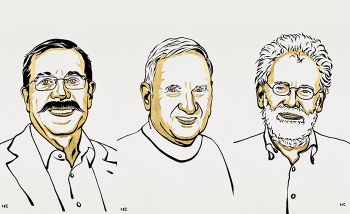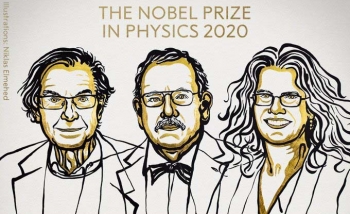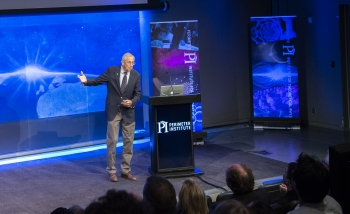Perimeter Institute congratulates Pierre Agostini, Ferenc Krausz, and Anne L’Huillier, who share the 2023 Nobel Prize in Physics. The Prize, announced today, recognizes the three scientists’ technique of using “attosecond bursts” to study electron processes inside atoms and molecules. This technique opened up a previously inaccessible world of ultrafast subatomic events.
Through painstaking, incremental work, Agostini, Krausz, and L’Huillier developed a method of precisely creating and combining light waves whose interference patterns formed pulses measured on the scale of attoseconds – a billionth of a billionth of a second. These bursts allow physicists to study photoelectric effects, photosynthesis, and other ultra-rapid processes where electrons move or change energy.
In addition to advancing fundamental research, attosecond bursts can be used to observe and affect chemical reactions, which could lead to revolutionary applications in medicine, electronics, and materials science.
“This prize honours an area of physics that required dedication and commitment over decades,” said Perimeter Director Robert Myers. “It is a remarkable achievement to be able to observe the physical world at the attosecond scale. This work is already driving many new discoveries, which we expect will continue for decades to come. I want to sincerely congratulate these brilliant, devoted physicists on their well-deserved recognition.”
The 2023 Prize is also notable because L’Huillier is only the fifth woman in history to win a Nobel Prize in Physics.
“We hope it won’t always be so rare for women to receive this kind of recognition,” said Myers. “L’Hullier will no doubt serve as an inspiration for new generations of women physicists.”
Visit the Nobel Prize website for more information on this year’s prize.
More information on the 2023 Nobel laureates:
- Pierre Agostini, Professor at Ohio State University, USA: Born in 1941 in Tunisia, obtained his PhD (1968) from Aix-Marseille University, France.
- Ferenc Krausz, Director at Max Planck Institute of Quantum Optics and Professor at Ludwig-Maximilians-Universität München, Germany: Born in 1962 in Hungary, obtained his PhD (1991) from Vienna University of Technology, Austria.
- Anne L’Huillier, Professor at Lund University, Sweden: Born in 1958 in France, obtained her PhD (1986) from University Pierre and Marie Curie, France.
À propos de l’IP
L'Institut Périmètre est le plus grand centre de recherche en physique théorique au monde. Fondé en 1999, cet institut indépendant vise à favoriser les percées dans la compréhension fondamentale de notre univers, des plus infimes particules au cosmos tout entier. Les recherches effectuées à l’Institut Périmètre reposent sur l'idée que la science fondamentale fait progresser le savoir humain et catalyse l'innovation, et que la physique théorique d'aujourd'hui est la technologie de demain. Situé dans la région de Waterloo, cet établissement sans but lucratif met de l'avant un partenariat public-privé unique en son genre avec entre autres les gouvernements de l'Ontario et du Canada. Il facilite la recherche de pointe, forme la prochaine génération de pionniers de la science et communique le pouvoir de la physique grâce à des programmes primés d'éducation et de vulgarisation.
Ceci pourrait vous intéresser


L'Institut Périmètre félicite les lauréats du Prix Nobel de physique 2020
janvier 14, 2021


